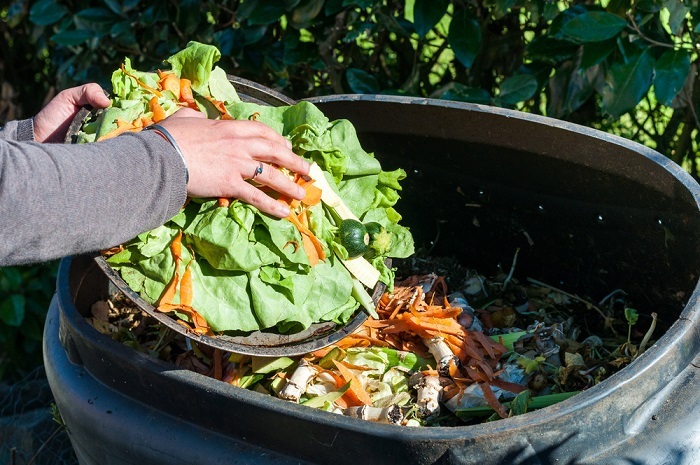
 Data Structure
Data Structure Networking
Networking RDBMS
RDBMS Operating System
Operating System Java
Java MS Excel
MS Excel iOS
iOS HTML
HTML CSS
CSS Android
Android Python
Python C Programming
C Programming C++
C++ C#
C# MongoDB
MongoDB MySQL
MySQL Javascript
Javascript PHP
PHP
- Selected Reading
- UPSC IAS Exams Notes
- Developer's Best Practices
- Questions and Answers
- Effective Resume Writing
- HR Interview Questions
- Computer Glossary
- Who is Who
What is Compost? Method and Types
Introduction
Composting is the process of breaking down organic waste materials into nutrient-rich soil amendments that can be used to enrich gardens, farms, and lawns. This process is achieved through the natural decomposition of organic matter by microorganisms such as bacteria, fungi, and other decomposers. Composting is an environmentally friendly and cost-effective way of managing organic waste. It has numerous benefits, both for individuals and for society.
In this article, we will explore some of the benefits of composting.

Methods of Composting
There methods of composting, includes aerobic and anaerobic composting.
Aerobic Composting
Aerobic composting is the most common method used for home composting. This method requires a mixture of organic waste materials, including grass clippings, food scraps, leaves, and other yard waste. The materials are then mixed and layered in a compost bin or pile, where they are regularly turned and aerated to promote the growth of microorganisms. As the microorganisms break down the organic materials, they release heat and carbon dioxide, which speeds up the composting process.
Anaerobic Composting
Anaerobic composting on the other hand, is often used in industrial composting facilities. This method involves collecting organic waste materials in a sealed container where the decomposition process occurs without the presence of air. Anaerobic composting is a slower process than aerobic composting, and it also produces methane gas, which is a potent greenhouse gas.
Types of Composting
Types of Composting There are several types of composting methods that can be used to achieve the desired product. The most common types include ?
Hot Composting
Hot composting is a method that involves creating a pile of organic waste materials that are high in nitrogen and carbon. These materials are then mixed and turned regularly to maintain a temperature between 131°F and 170°F. Hot composting is a fast and efficient method that produces high-quality compost in just a few weeks.
Cold Composting
Cold composting is a slow method that involves piling organic waste materials and allowing them to decompose over time. This method does not require regular turning or a specific temperature range, but it can take up to a year to produce usable compost.
Vermicomposting
Vermicomposting is a method that uses worms to break down organic waste materials. This method involves creating a worm bin and adding food scraps and other organic materials to the bin. The worms then consume the organic materials and produce nutrient-rich castings that can be used as compost.
Bokashi Composting
Bokashi composting is a method that involves fermenting organic waste materials using a special mixture of microorganisms. This method involves layering food scraps and other organic materials with the bokashi mix in an airtight container. The mixture is then left to ferment for several weeks before being added to a compost bin or pile.
Composting is an excellent way to reduce waste and promote environmental sustainability. By composting organic waste materials, we can divert these materials from landfills, where they would otherwise produce methane gas and contribute to climate change. Composting also helps to improve soil health by adding nutrient-rich organic matter to the soil.
In addition to the environmental benefits, composting can also save money by reducing the need for chemical fertilizers and soil amendments. Composting can also be a fun and rewarding hobby that helps to connect us to the natural world.
Benefits of Composting
Composting has numerous benefits for individuals and society. By composting organic waste, we can reduce the below factors. Composting is a simple and effective way to reduce waste and promote environmental sustainability.
Reduces Landfill Waste
Composting diverts organic waste from landfills, where it would otherwise decompose and release methane gas. Methane gas is a potent greenhouse gas that contributes to climate change. By composting organic waste, we can reduce the amount of methane gas that is released into the atmosphere and thus mitigate the effects of climate change.
Improves Soil Health
Compost is a natural fertilizer that is rich in nutrients such as nitrogen, phosphorus, and potassium. These nutrients are essential for plant growth, and adding compost to soil can improve soil structure, water retention, and nutrient availability. Compost also helps to promote the growth of beneficial microorganisms that contribute to soil health.
Saves Money
Composting can save money by reducing the need for chemical fertilizers and soil amendments. Compost is a natural fertilizer that can be used to replace synthetic fertilizers, which can be expensive. Composting can also reduce the amount of waste that is sent to landfills, which can save municipalities money in tipping fees.
Reduces Greenhouse Gas Emissions
Composting can help to reduce greenhouse gas emissions by diverting organic waste from landfills. When organic waste decomposes in landfills, it releases methane gas, which is a potent greenhouse gas that contributes to climate change. By composting organic waste, we can reduce the amount of methane gas that is released into the atmosphere and thus mitigate the effects of climate changes.
Promotes Biodiversity
Composting promotes biodiversity by providing habitat for beneficial microorganisms and insects. These microorganisms and insects contribute to soil health and help to control pests and diseases.
Reduces Water Use
Compost can improve soil water retention, which can reduce the amount of water that is needed for irrigation. This is especially important in areas with limited water resources.
Reduces Chemical Use
Composting can reduce the use of synthetic pesticides and herbicides. Compost contains beneficial microorganisms that can help to control pests and diseases, reducing the need for chemical treatments.
Conclusion
Composting is an easy and effective way to reduce waste, save money, and promote environmental sustainability. Whether you choose to use a hot composting method or prefer to let your organic materials decompose slowly over time, there is a composting method that will work for you. By composting, we can all do our part to create a more sustainable future for ourselves and for future generations.

